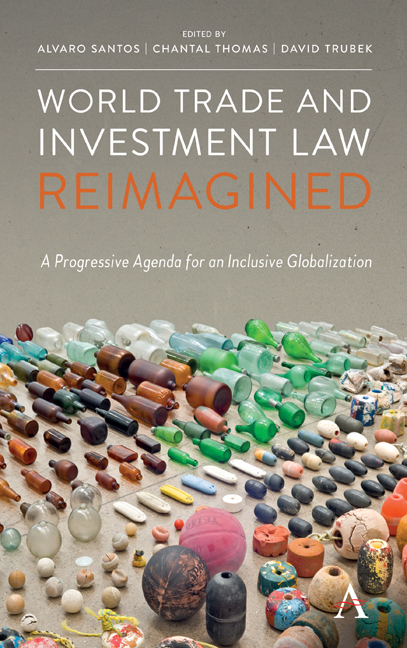Book contents
- Frontmatter
- Contents
- Acknowledgments
- List of Contributors
- Introduction World Trade and Investment Law in a Time of Crisis: Distribution, Development and Social Protection
- PART I RETHINKING THE POLITICAL ECONOMY OF TRADE: COMMENTS ON DANI RODRIK'S STRAIGHT TALK ON TRADE
- PART II SETTING THE STAGE FOR A PROGRESSIVE VISION: EMERGING ISSUES IN WORLD TRADE AND INVESTMENT LAW
- SECTION 1 MAPPING THE NEW CONTEXT FOR TRADE AND INVESTMENT LAW
- SECTION 2 DEALING WITH MAJOR CHANGES IN THE WORLD ECONOMY
- Chapter Eleven Trade, Distribution and Development under Supply Chain Capitalism
- Chapter Twelve The Global Rise and Regulation of Platform Firms and Markets
- Chapter Thirteen How Should We Think about a Global Market in Legal Cannabis?
- SECTION 3 FRAMING A MORE EQUITABLE INVESTMENT LAW REGIME
- SECTION 4 SUPPORTING DEVELOPMENT
- SECTION 5 REINFORCING SOCIAL PROTECTION: SPREADING THE BENEFITS OF TRADE, DEALING WITH LOSSES AND EXPLORING THE TRADE–IMMIGRATION NEXUS
- Index
Chapter Thirteen - How Should We Think about a Global Market in Legal Cannabis?
from SECTION 2 - DEALING WITH MAJOR CHANGES IN THE WORLD ECONOMY
Published online by Cambridge University Press: 07 September 2019
- Frontmatter
- Contents
- Acknowledgments
- List of Contributors
- Introduction World Trade and Investment Law in a Time of Crisis: Distribution, Development and Social Protection
- PART I RETHINKING THE POLITICAL ECONOMY OF TRADE: COMMENTS ON DANI RODRIK'S STRAIGHT TALK ON TRADE
- PART II SETTING THE STAGE FOR A PROGRESSIVE VISION: EMERGING ISSUES IN WORLD TRADE AND INVESTMENT LAW
- SECTION 1 MAPPING THE NEW CONTEXT FOR TRADE AND INVESTMENT LAW
- SECTION 2 DEALING WITH MAJOR CHANGES IN THE WORLD ECONOMY
- Chapter Eleven Trade, Distribution and Development under Supply Chain Capitalism
- Chapter Twelve The Global Rise and Regulation of Platform Firms and Markets
- Chapter Thirteen How Should We Think about a Global Market in Legal Cannabis?
- SECTION 3 FRAMING A MORE EQUITABLE INVESTMENT LAW REGIME
- SECTION 4 SUPPORTING DEVELOPMENT
- SECTION 5 REINFORCING SOCIAL PROTECTION: SPREADING THE BENEFITS OF TRADE, DEALING WITH LOSSES AND EXPLORING THE TRADE–IMMIGRATION NEXUS
- Index
Summary
Although the trade and distribution of cannabis is (largely) prohibited under international law, as well as in most domestic legal systems, there is now a noticeable trend to decriminalize and regulate its use for medicinal, and in some cases recreational, purposes. A number of US states have moved in this direction, although federal US law continues to criminalize the use of cannabis. Uruguay has legalized recreational use, and Canada recently enacted similar legislation. Should international law be modified or interpreted so as to facilitate trade and investment in cannabis (and related products and services) between domestic jurisdictions where legalization has occurred? How do the principles and rules of international trade and investment law relate to the United Nations (UN) regime and its possible evolution toward permissiveness of global market activity in cannabis?
Debates about the legalization of cannabis use have been intense in many jurisdictions. To understand the implications of the internationalization of an emerging legal cannabis market, we must start with the diverse policy objectives often asserted for legalization. In the case of medical cannabis, improved health outcomes is the obvious objective; for recreational use, the objective is to counter the negative consequences of criminal activity. As social values change, impetus for legalization may also come from the belief that it is unfair that a widely socially accepted activity should put individuals at risk of a criminal record; in many cases, the criminal law is applied in a manner grossly inconsistent with social equality, with primarily disadvantaged minorities targeted for criminal sanction and possible incarceration. Another motivation for legalization is fiscal: governments can capture tax revenue that is not available from the criminal market. Finally, many believe that cannabis is a social drug that, when not abused, is relatively benign and generates a market for many spin-off goods and services, therefore generating revenue and contributing to economic growth and development.
Shaping Global Markets to Support the Domestic Objectives of Legalization
Domestic governments may need to shape or control how international actors participate in the emerging legal market for cannabis. Two particular areas of concern are the roles that Big Pharma and Big Tobacco, and perhaps Big Alcohol, may play in markets where cannabis is legalized.
- Type
- Chapter
- Information
- World Trade and Investment Law ReimaginedA Progressive Agenda for an Inclusive Globalization, pp. 141 - 152Publisher: Anthem PressPrint publication year: 2019



